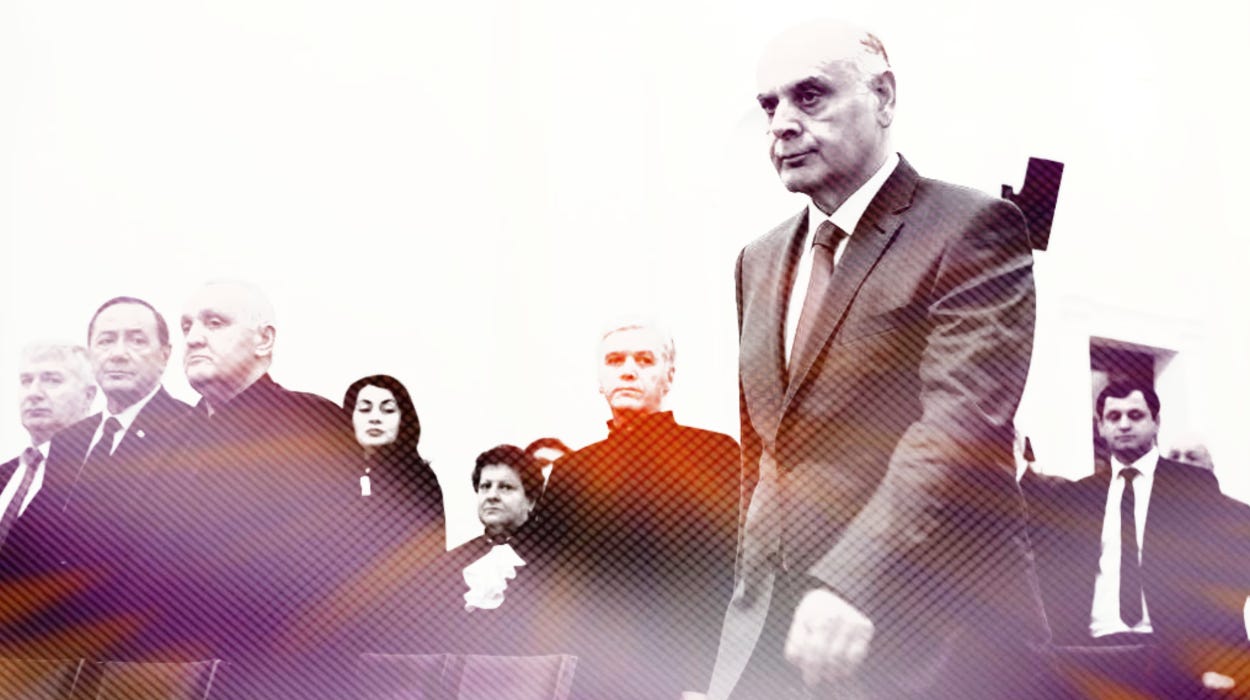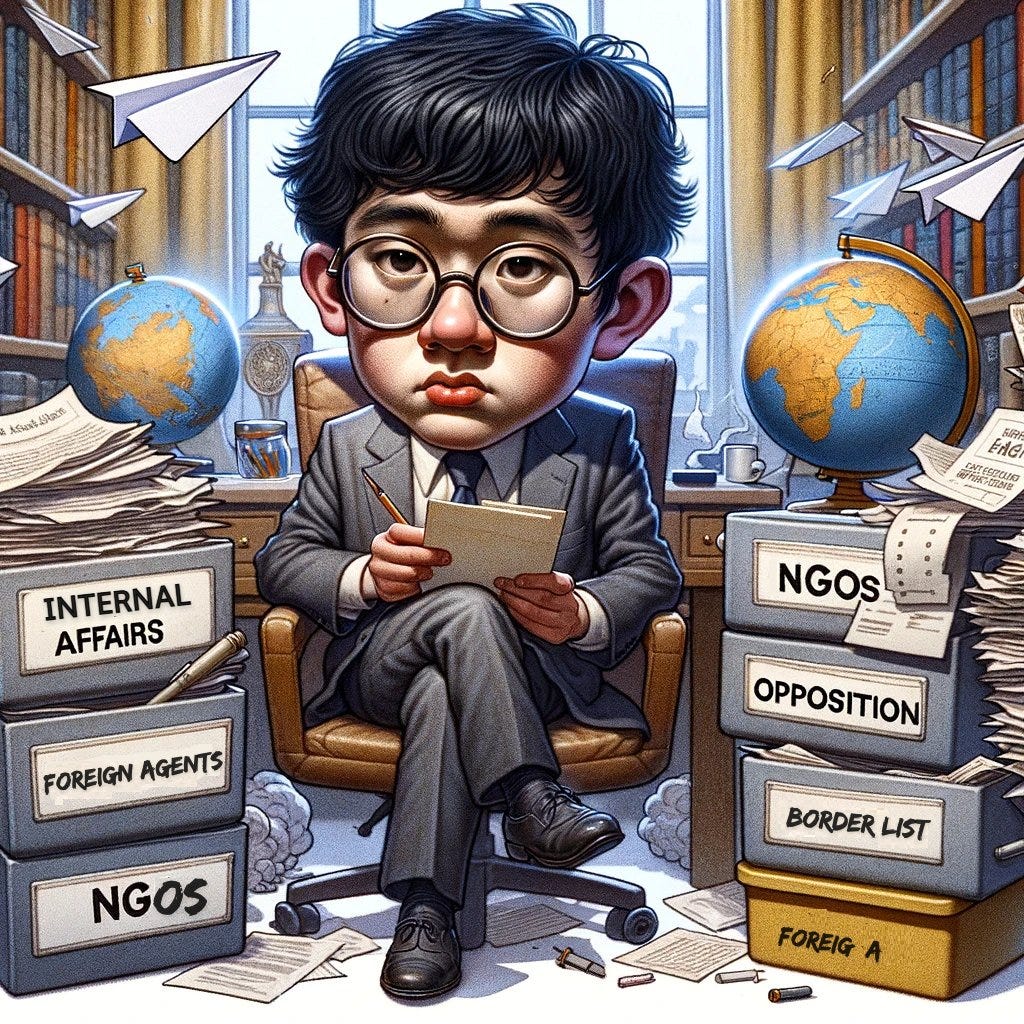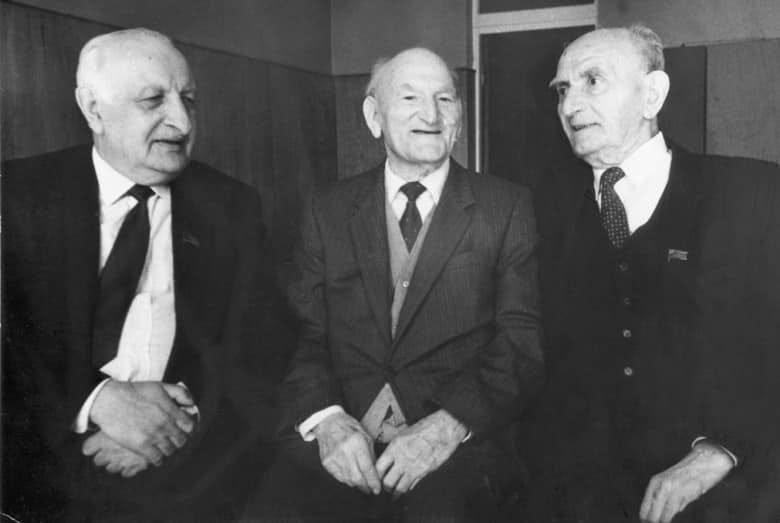The Sputnik Sham: How Propaganda Undermines Abkhazian NGOs
In a striking display of propagandistic rhetoric, Sputnik Abkhazia recently published a vehemently accusatory article targeting Abkhazian NGOs.
SUKHUM / AQW'A — The policy of repression and intimidation against Abkhazian NGOs, their members, and outspoken critics has escalated, spiralling out of control. Dissenters are increasingly facing interrogations at borders, state media propagates falsehoods against them, and their voices are systematically excluded from mainstream media channels.
In a striking display of propagandistic rhetoric, Sputnik Abkhazia recently published a vehemently accusatory article targeting Abkhazian NGOs. This piece, lacking in authorial accountability, launches a vitriolic assault not only on these organisations but also on specific public figures, notably Liana Kvarchelia, Arda Inal-ipa for their involvement in internationally supported projects. The article weaves a calculated narrative, laden with conspiracy theories and fear-mongering, depicting these NGOs as puppets in a grand Western scheme aimed at destabilising Abkhaz-Russian relations and manipulating the region’s political trajectory.
The article aggressively frames the organisations' efforts in language preservation and youth leadership as sinister ploys, covertly orchestrated by Western powers. This approach seeks to discredit the vital work of these NGOs, insinuating a nefarious intent behind every Western-supported action. Echoing the sentiments of Abkhaz Foreign Minister Inal Ardzinba, the piece portrays increased regulatory scrutiny of NGOs as a necessary measure to guard against foreign interference, reinforcing a narrative of siege and suspicion.
This unabashedly biassed and hostile article represents a disturbing trend in the media landscape, where objective journalism is sacrificed for political agendas. It undermines the genuine efforts of NGOs striving for social progress and betterment in Abkhazia, casting a shadow of doubt and conspiracy over their initiatives. The absence of an author’s name adds to the insidious nature of this publication, suggesting a deliberate attempt to fuel discord and mistrust under the guise of protecting national sovereignty. It exemplifies the weaponisation of media to stoke fears, suppress dissent, and control narratives in a region embroiled in complex geopolitical tensions.
Amidst this tumultuous backdrop, public figure Tengiz Dzhopua provides a poignant counter-narrative:
"Since when has it become right for an Abkhaz to sell another Abkhaz?"
"Are you a criminal just because you receive money from international organisations? Which part of the criminal code says that? I don't seem to recall. Let's assume these funds were used for criminal activities, as specified in criminal law, then what exactly does that entail?
Did they use this money to blow up train tracks, derail trains, poison wells, and murder party members and young Komsomol members from hiding? What exactly did they do? What is their crime? Let's start from the beginning and eventually get to the money.
They helped villages, supported Abkhaz medicine, aided schools, published literature in the native language, and provided vaccines, fertilisers, pesticides for treating crops. Why didn't law enforcement mention this? Where is the evidence of their crime?
And since when does a citizen of a country have to prove to someone that he is not a camel? Have we abolished the presumption of innocence? What kind of nonsense is happening, what heresy in reasoning, what is this attitude of Abkhaz towards other Abkhaz? Have you guys gone mad?
Beating our own people regardless of surnames, kinship ties, or national identity for stars from the West or the East, I don't care at all, is this now normal? Since when has it become right for an Abkhaz to sell another Abkhaz?
Such actions are only characteristic of a certain contingent, denoted by the letter 'b'. And it doesn't matter whether it's 'official b', as Vysotsky said, or streetwise. They are 'b' in Africa too!"
Leuan Lagulaa, Editor of ApsnyHabar:
The photo shows "bourgeois nationalists" and "fascist elements." Also featured in this photo are some of the bravest figures in Abkhazian history, the authors of the first 'Abkhazian letter.'
How old were the true representatives of the Abkhazian intelligentsia when they penned the letter destined for Stalin, a letter that would inevitably be intercepted by Beria?
Konstantin Shakryl was 47 years old, Georgiy Dzidzaria was 33, and Bagrat Shinkuba was 30.
In 2024, on platforms like 'Sputnik' and semi-anonymous Telegram channels that promote the current authorities' views, the patriots of Abkhazia, as seen in the photograph, are disparaged as 'foreign agents' and 'Abkhazian nationalists...
Leuan Lagulaa
________________
AW's note: In February 1947, the Abkhazian scholars Georgiy Dzidzaria, Konstantin Shakryl, and Bagrat Shinkuba wrote a letter to the Central Committee of the All-Union Communist Party of Bolsheviks which spoke about numerous violations of the rights of the Abkhazian people.
In 1937, the Abkhazian intelligentsia faced mass repressions. In this way did Beria set himself the task of completely ‘decapitating’ the Abkhazian people, depriving them of an intelligentsia and a future. Remarkably, a portion of the Abkhazian intelligentsia that survived the purges endeavoured, with their limited means, to protect their people. They aimed to inform the highest echelons of the Soviet Union about the dire circumstances unfolding in Abkhazia. This letter was essentially a cry of despair, penned with the acute awareness of whose hands it would ultimately fall into."
Without a doubt, the authors of the letter knew that the letter would fall into the hands of Stalin, who would hand it over to Beria, but they did not see any other way out.
Quotation from the Letter
"Recently, in Abkhazia there has unfortunately existed a situation that fundamentally contradicts and distorts the national policies of our Bolshevik party and the Soviet government. We, as party members, consider it our absolute duty to inform the Central Committee."
The book ‘The History of Abkhazia from Ancient Times to Our Day’ by Oleg Bgazhba and Stanislav Lakoba details specific grievances addressed in the letter.
"Specifically, the closure of schools, the resettlement-policies in Abkhazia, the renaming of settlements, streets, and towns, the violations in the selection and placement of personnel, etc.. were set out. And the authors of the letter were severely punished — they were charged with an attempt to misinform the Central Committee of the CPSU (b) and defamation of the Abkhazian party-organisation. Over subsequent years, they were given the labels of ‘bourgeois nationalists’ and ‘fascist elements’, and this continued until 1953."
The Abkhazian opposition has labelled the president as "essentially a foreign agent."

Vitaly Sharia | Ekho Kavkaza — Late last week, several Abkhazian opposition political groups released statements, marking the first time this year that the executive authority faced accusations.
Prominently, the online community focused on a joint statement by five opposition groups, headlined in the media as "Opposition calls to sabotage the current regime." The statement opens with a critique of the country's fuel and energy situation:
“In light of the Republic’s circumstances, the current government should have voluntarily resigned long ago. At the People's Meeting in Sukhum on May 30 last year, a key demand was the resignation of the utterly bankrupt and detrimental Government. Such a step was the only way to halt the country’s further decline. It was already evident that this team’s continued rule would only aggravate the nation’s economic and social problems. Regrettably, the consequences soon became apparent. At the year’s end, Abkhazia’s citizens bore the cost of their mistakes, paying one billion rubles for excessive electricity consumption. Now, as 2024 begins, we face widespread power outages. Yet, their ambition didn’t stop there. The next target is the monopolisation of the fuel market. Portraying the fuel market’s forceful takeover by a company linked to the Cabinet’s top echelons as a covert decision by the Russian Government to favour RN ‘Abkhazia’ is hardly convincing. We recognise that Rosneft has been a responsible market player and a model taxpayer in Abkhazia since 2009, with no prior issues. The onset of soaring prices, shortages, and now attempts at market monopolisation coincided with the emergence of the Podorozhnik gas station network, owned by ‘Apsny Oil,’ directly tied to the current leadership.”
The appeal's authors assert that these and other national issues arise from the elected president's neglect and indifference towards his people since 2020. Continuing, they state:
“Aslan Bzhania’s disregard for the populace was starkly evident during the devastating fire at the National Art Gallery (the Central Exhibition Hall of the Union of Artists of Abkhazia where the National Art Gallery's entire collection housed — Trans.). As the nation grieved over this cultural loss, Bzhania, after briefly appearing before cameras at the smouldering site, quickly left for a lavish banquet at the state-owned Ritsa lake dacha. Discussions about reforms or fulfilling electoral promises have ceased. We solemnly declare that there is an ongoing and deliberate dismantling of Abkhaz statehood. The substitution of local businesses with foreign oligarchs, the destruction of the energy sector, the influx of hundreds of thousands of foreign nationals, among other actions, are part of Aslan Bzhania's policy under the pretext that ‘The Abkhazian people are incapable on their own.’ For the first time in modern history, the incumbent president is effectively a foreign agent and a catalyst for anti-Russian sentiments.”
The document concludes with a call “to all citizens of the nation, irrespective of their political beliefs, ethnicity, or religion, to resist and undermine the efforts of the present regime that is intent on destroying the country and its people.” This appeal is endorsed by the political parties “FNEA” and “Apsny,” along with the public organisations “Aruaa,” “AND,” and “Our Capital.” The first four groups have been collaborating since autumn 2020, and were joined last year by “Our Capital.”
Said Gezerdaa: "State Security as a Tool for Blackmail and Compromise"
Elena Zavodskaya | Ekho Kavkaza — Representatives of non-governmental organisations in Abkhazia are experiencing pressure from the Ministry of Foreign Affairs, the State Security Service, and Abkhazian State Television. They have approached television broadcasters to exercise their legally guaranteed right of reply and are open to meeting with the Ministry of Foreign Affairs' leadership, provided that independent journalists are present. To date, their efforts to secure a response have been unsuccessful.
Inal Ardzinba, the Minister of Foreign Affairs of Abkhazia, has adopted a rigid and uncharacteristically undiplomatic stance in dealing with international organisations in Abkhazia and in suppressing local NGOs. The latter, composed of civil activists, have been vocal in their criticism of governmental actions.
Recently, Abkhazian Telegram channels have been disseminating statements from well-known civil society figures. They are asserting their right to a rebuttal on Abkhazian State Television, as stipulated by the 'On Media' law. This move comes in the wake of allegations made by Zaal Khvartskiya, the Deputy Chairman of the State Security Service of the Republic of Abkhazia, on air, where he accused NGOs of undermining the country's political stability.
Lawyer Said Gezerdaa has shed light on recent communications with the heads of Abkhazian State Television (AGTRK).
Milana Tsvizhba: Abkhazia Shuts Doors to Those Questioning Sovereignty
SUKHUM / AQW'A — Milana Tsvizhba, Head of the Press Service at the Foreign Ministry of the Republic of Abkhazia, has responded to statements made by Toivo Klaar, the EU Special Representative for the South Caucasus. Klaar had previously reported being denied a visa by Abkhazian authorities on two occasions, leading to his remark, “Today we have however arrived at a situation where Abkhazia seems to be closing down.”
Tsvizhba's comments, published under the title "Toivo Klaar's Georgian Dream," criticise Klaar's statement as exposing the failure of Western collective policy in Abkhazia. She argues, “Mr. Klaar’s commitment to ‘engagement without recognition’ plainly reveals the involvement of both international and Abkhazian NGOs in pursuing this agenda. The emphasis on fostering dialogue between Abkhazians and Georgians across the so-called dividing lines fails to acknowledge these as legitimate state borders.”
Addressing Klaar’s frequent visits to Abkhazia, Tsvizhba notes, “Despite his numerous visits, Mr. Klaar seems to have overlooked our history. His statements only reiterate the misguided stance of the collective West and the EU.”
She further demands that Klaar refrain from using the "misleading and provocative toponym" of "Sukhumi," and asserts, “European, American, and Georgian officials must realise that we will permanently close our doors to those who perceive us as an 'occupied territory.'” (In August 1936, a new legislation titled 'On the Correct Typeface Names of Settlements' was introduced. This law mandated a change in toponyms across Abkhazia, shifting them from Abkhaz or Russian language spelling to Georgian rules. As a result, the capital of Abkhazia, known as Sukhum, officially became Sukhumi. See: The Great Terror in Abkhazia (Abkhaz ASSR, 1937 - 1938) Vol. II p.204 —Ed.)
Tsvizhba reaffirms Abkhazia's intention to actively participate in the Geneva International Discussions on Security and Stability in the Caucasus, aiming for outcomes that respect the state sovereignty and equal dialogue principles of the Republic of Abkhazia.
Navigating the Diplomatic Waters: Abkhaz Foreign Ministry's Sea of Responsibilities









